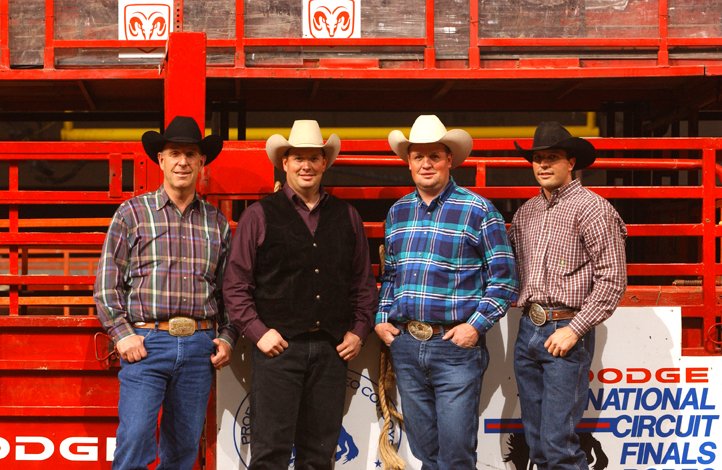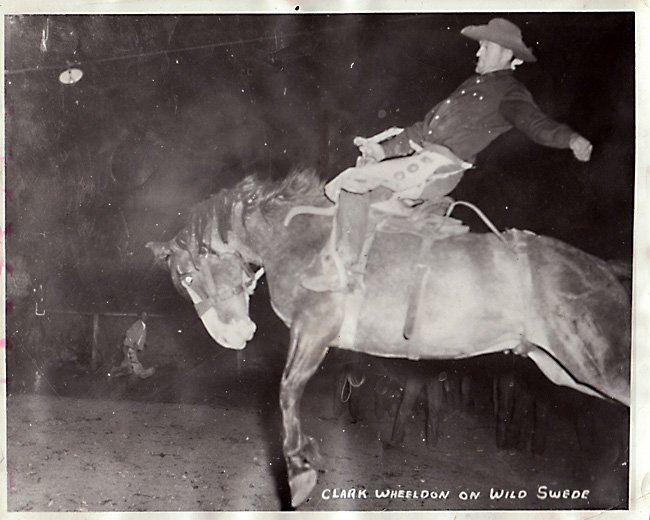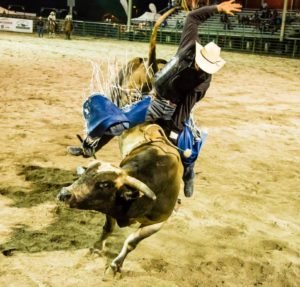
Three Generations of Cowboys: The Family Behind the Jackson Hole Rodeo
The Wilson family not only runs the Jackson Hole Rodeo and comes from a long line of cowboys, cowgirls and ranchers– they’re also descendants of one of the very first settlers of the iconic Western town of Jackson, Wyoming.
In 1890, Sylvestor Wilson brought the first group of settlers over Teton Pass into what is now known as Jackson Hole. Six generations have passed, but the Wilson family still plays a pivotal role in keeping the Western spirit alive in Jackson through their work at the Jackson Hole Rodeo.
Phillip Wilson, the great-grandson of Sylvestor, runs the rodeo with his three sons. Just about everyone in the family, including their wives and grandchildren, hold positions in the business as well.
Phillip said the best part of rodeoing is that the whole family is involved. His sons and grandkids live on the same drive and huge family meals are the norm.
“We get to spend all day long on rodeo days with the grandkids,” Phillip said. “Those are the loves of our lives: our grandkids, the rodeo and the Lord. We’re blessed to have that ability to be with our family.”
Jackson Changing Over the Years

Clark Wheeldon riding a bucking bronco– three generations ago in the Wilson family.
Brandon Wilson, one of Phillip’s sons, grew up around ranching and rodeo culture his whole life. However, Jackson isn’t exactly the same place it was when Brandon was growing up in the 70’s. Over the years, the presence of the acclaimed ski resort grew and now the town plays host to plenty of out-of-towners and second home owners.
“When I was a kid, all you had to do was talk to a friend and you could go find some place to find some calves, steers or some bucking horses to get on,” Brandon said. “It was a ranching community. Now, [Jackson’s] developed into this huge tourist mecca and the ranching is pushed out. So now there are fewer opportunities for the kids that want to ride bulls or bucking horses.”
The Wilson family provides the opportunity for young people to develop these skills and compete in their rodeo. Over the years, the Jackson Hole Rodeo has earned quite a name for itself. Kids come from as far as Australia and Mexico to work in town while improving their rodeo skills, whether it be barrel racing, bull riding or roping.
Many young aspiring cowboys and cowgirls start with something a little bit more approachable– mutton busting. Children from about age five to six strap on helmets and ride sheep for as long as they can before falling off.
The Danger Involved

A Bullrider at the Jackson Hole Rodeo
Brandon’s nephew, Levi Wilson, has long graduated from sheep and participates in the most dangerous event the rodeo has to offer: bull riding. The 23-year-old went to college on a rodeo scholarship. Now he’s graduated, Levi works with the family, helping to run the rodeos and tend the livestock, and hopes to soon ride bulls full-time for a living.
Over the years, he’s accrued quite a catalog of injuries– a shattered arm, a torn groin, a ruptured spleen– but nevertheless Levi said he’s never thought about quitting.
“You can’t ride bulls just so you can tell somebody you’re a bull rider or to pick up girls at the bar,” Levi said. “It has to be in your blood, like it’s all you can think about. So the little injuries can’t be something that slows you down.”
Brandon said that cowboys and cowgirls recognize the inherent danger of rodeo sports, but the camaraderie, the community and the thrill make it worth the risk for most competitors.
“It’s never going to be 100 percent safe, but that is also true of any sport,” Brandon said. “With football or skiing, there’s always going to be accidents. So we can’t make it safe, but what we can do is remove some of that danger by doing things like choosing the right animal for the right rider.”
Two Sides to Rodeo Animals

Jackson Hole Rodeo Rider
From bulls to horses to sheep, animals are essential components of rodeo life.
“These bulls are pretty much family,” Levi said. “We’re with them every single day. You grow a relationship there. A lot of our bulls are two completely different animals at home and uptown. These animals know their job and I think they crave it and love it just as much as the rest of us do.”
Brandon acknowledged that there is an assumption that rodeo animals are treated badly, but said “that couldn’t be farther from the truth.” There’s no motivation to mistreat animals in the rodeo world, he said. You want them healthy and ready to compete.
Leading up to the competition, Brandon said the bulls are fed 19% protein grain, which gives them a lot of energy. Plus, there’s something to be said about the energy of the rodeo competition itself that gets them riled up.
“At home, you can go up and scratch some of them, but then you get them into the rodeo and you get the lights going and the sound,” Levi said. “They know their job and they become a completely different beast. They psych themselves up to compete just as much as we do.”
Moving Forward

A few of the Wilson family members behind the Jackson Hole Rodeo.
Typically, the Jackson Hole Rodeo hosts 30 to 40 rodeos a year. In 2019, an astounding 44,000 attendees visited and Brandon said the family anticipated 2020 being their best year yet.
But like so many other industries, the rodeo business was hit hard by the COVID-19 pandemic this past year. As live events across the country were cancelled, the rodeo’s revenue was cut off, but the Wilsons still had to continue the expensive tasks of feeding and caring for their stock.
However, as more people are vaccinated and prospects for travel seem brighter and brighter this year, hopes for reopening the Jackson Hole Rodeo again are high.
“I think [the rodeo is] a great way to enjoy our heritage as Western people,” Brandon said. “Just talking about the competition and the camaraderie of what rodeo is… I want more people to see it and experience it so they can understand what a great sport it is.”
Interested in going to a rodeo? Check out these sample Western itineraries:
Yellowstone and Grand Teton Road Trip
Going Wild in West Texas: A Private Ranch Road Trip
Images courtesy of Jackson Hole Rodeo website
